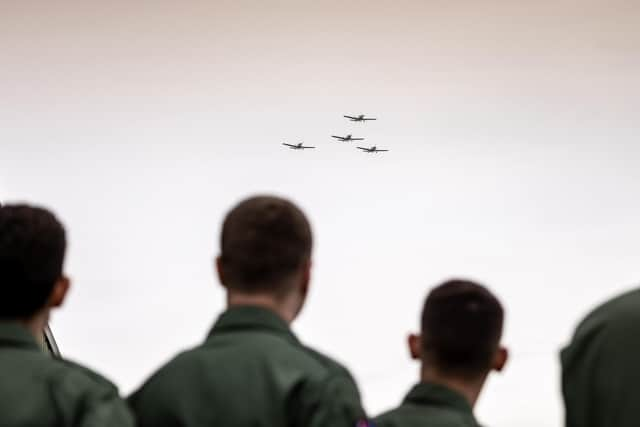Where does the $61bn assistance package from the US leave the conflict in Ukraine? - Patrick Mercer
True, much of it will go towards replenishing US munition stocks and some to humanitarian organisations, but the bulk will show up as rapid, military help.
And it’s not a moment too soon for Kiev. Events in the Middle East have largely overshadowed the desperate situation in which the Ukrainians find themselves.
Advertisement
Hide AdAdvertisement
Hide AdRussia’s troops have recently overrun a couple of cities and a large number of towns and villages and are remorselessly advancing across most of the line of contact.


Much more important than acreage, though, the Kremlin’s forces have killed large numbers of Kiev’s men, destroyed a lot of armoured and other vehicles and, crucially, established air superiority not just over the front lines, but also deep into Ukraine.
With a critical shortage of air defence weapons, Ukrainian power plants, railways and vital infrastructure behind the lines have been struck and struck again by Russian aircraft and the massively powerful glide bombs that are now being used in profusion.
Similarly, troop and vehicle concentrations at the front have suffered terribly from Russian bombers which are romping, almost unopposed, across the skies.
Advertisement
Hide AdAdvertisement
Hide AdWith only limited power to fend off his enemies, Mr Zelensky has asked time and again why US, UK, French and a number of other nations’ aircraft were used to shoot down Iranian missiles aimed at Israel, but have never been offered to Kiev to combat Russian attacks.
No satisfactory answer has been given and it’s got to be assumed that the West thinks that Israel’s cause is more important than Ukraine’s, despite the ceaseless tub thumping and jingoism that we’ve heard from NATO over the past couple of years.
Now the semantics have become unimportant. Pro-Ukrainian sources are talking openly about an imminent collapse unless Kiev’s troops are helped and helped quickly. Now, I’d be very surprised if NATO hasn’t got vital ammunition and weapons already loaded and very close to the border.
Indeed, one US senator claims that ATACMS missiles could be in their ally’s hands within a week despite this being one of those weapons that was never going to be given to Kiev as it might allow provocative attacks well beyond the Russian border.
Advertisement
Hide AdAdvertisement
Hide AdSo, assuming that Ukraine is on the ropes but with help near at hand, what is Russia going to do? With refurbished and powerful forces poised across the front, but concentrated in the north near Kharkov, I’m sure that the generals are champing at the bit.
An assault on Kiev’s weakened brigades would complete the conquest of Donetsk and Luhansk oblasts by driving their enemies back to the line of the Dneiper river.
Whilst that might be tactically sound, there’s now only a limited window for Moscow to achieve this before new air defence equipment makes itself felt.
Russian aircraft would then no longer fly with impunity and ground forces would once more be exposed to the whip of Ukrainian shells and drones.
Advertisement
Hide AdAdvertisement
Hide AdAnd, of course, such a sweeping advance would be very costly to Moscow, even if successful. Now, there’s much talk in the Western media about ‘human wave’ attacks suggesting that Moscow is careless of her troops’ lives, but that’s just lazy propaganda. Remember how Russian history is studded with examples of heavy, military casualties which have provoked revolutions?
Russia has always been politically febrile and that probably explains why Mr Putin has been remarkably cautious about the human cost of this war. Look no further than his energetic recruitment of regular soldiers and how the country is increasingly turning away from conscription and the disquiet it causes.
And this also explains the Kremlin’s tactics of attacking energy and commercial targets deep inside Ukraine. If the population can be coerced by darkness, cold and hunger into rising up against their government, then Moscow could spin Mr Zelensky’s fall as the will of his own people whilst, at the same time, saving Russian blood.
Yet, for both NATO and Russia, the key event is the US election next November. There is every sign that if Mr Trump wins he will bring the war in Ukraine to a quick halt - largely on Russia’s terms - and cause a very hard rain to fall on NATO. The fact is that whilst US funding was stalled, the European nations were either unwilling or incapable of sustaining Ukraine and this has not been missed by the Kremlin.
Advertisement
Hide AdAdvertisement
Hide AdSo, Mr Trump’s election is important for Russia, not just because of Ukraine but for longer term relations. President Putin cannot, therefore, strengthen Mr Biden’s hand by dealing a bloody blow to a currently enfeebled Kiev as this will unify the West behind a Democrat president.
It’s a tricky balance for Mr Putin. Spring and early summer are excellent for campaigning, the enemy is weak and his generals are keen. Meanwhile NATO, with its debacle in Afghanistan still fresh in people’s minds, is in disarray, but - and it’s a big but - American guns and butter could very shortly shift the whole balance of the war and help the very man whom Russia does not want to be president.
There’s another, vital factor, though: Ukraine’s run out of manpower and the only quick fix for that is an intervention by NATO troops - which is what the French are currently considering. So, the next few weeks will be crucial: does Russia gamble military advantage against political disaster, or does the West send her troops and risk the start of a full-on war? Either way, Neocons and neo-imperialists will still cheer on the slaughter.
Patrick Mercer is a former MP for Newark and Army colonel.
Comment Guidelines
National World encourages reader discussion on our stories. User feedback, insights and back-and-forth exchanges add a rich layer of context to reporting. Please review our Community Guidelines before commenting.